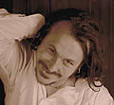This review was first
published on CLUAS in 2002
Other albums reviewed in 2002
Doctor Millar and the Beet Club
A review of their album 'Always Coming Home'
Doctor Millar (AKA Sean Miller) with his acerbic wit and intelligent lyrics
is one of Ireland's best-kept musical secrets. Though his first two albums -
'The Bitter Lie' and 'The Deal' - were critically lauded, the music of this
exceptionally talented songwriter continues to be overlooked by radio
programmers and the general public. Listening to his latest release 'Always
Coming Home', it appears that both his song writing and commercial reputations
will remain intact.
 It's
not that the good Doctor hasn't strayed a bit from his themes of alcohol
addiction, adultery, lying, cheating, jealousy, paranoia, Irish politics, and
the sexual awakening of a priest that featured on 'The Bitter Lie', because he
has. The title track of his new album is a superb song of hope and intense
beauty where a piano and acoustic guitar subtly intertwine around gentle lyrics
of longing for that place called home.
It's
not that the good Doctor hasn't strayed a bit from his themes of alcohol
addiction, adultery, lying, cheating, jealousy, paranoia, Irish politics, and
the sexual awakening of a priest that featured on 'The Bitter Lie', because he
has. The title track of his new album is a superb song of hope and intense
beauty where a piano and acoustic guitar subtly intertwine around gentle lyrics
of longing for that place called home.
Second track 'Feel Everything and Love Yourself' combines a melancholy musical
undertow with positive lyrical uppers that escape to the surface like bubbles in
a rough sea. This song should be prescribed for anyone suffering from
depression.
'Everyclown' is a Neil Young meets Emmylou Harris country-tinged ode to
turbulent love that could easily compete with Young's best work. Interesting to
note that Young was once sued by his record company for his supposed intentional
writing of non-commercial songs. These first three tracks would be a shining
light on any play list and deserve airplay as much as Young's or David Gray's
best creations.
The country feel continues with the opportunist stealing storyline of 'Hard
Years', while 'One More Shot' is a plea for love backed by a poppy
guitar/piano-interplay. The soft
beauty-with-most-of-the-thorns-hidden-in-the-distance quality of these opening
tracks definitely matches the picture of the pink rose on the CD itself.
The notes that came with the CD indicate track listings for a side A and a side
B, so after the end-of-record scratchy hiss following track six, I decided to
turn over the CD to see what was on 'side B'. What greeted me was a view of my
surroundings imperfectly reflecting off of the silver back of the disc. With the
CD placed back upright in the player and spinning again, the five tracks on
'side B' provided musical vignettes that lyrically reflect the imperfect
surroundings of Millar's protagonists. The storylines touch on homicidal
tendencies, lost love, and moving on.
If the tracks on side A move the heart as well as the head, then the songs on
side B move the mind while musically eliciting the feel of movement. 'You Just
Can't Let Things Go', 'Your Daddy's Name and My Photograph', and 'Rock to Roll'
all roll past by like a locomotive chugging on down the line. These three songs
are visceral experiences.
This Doctor manages to take care of the mental and the physical sides of his
patients. After his work is over, Doctor Miller might always be coming home to
his non-commercial genius, but as Dorothy from the Wizard of Oz would say,
"there's no place like home."
Barbara Lindberg
